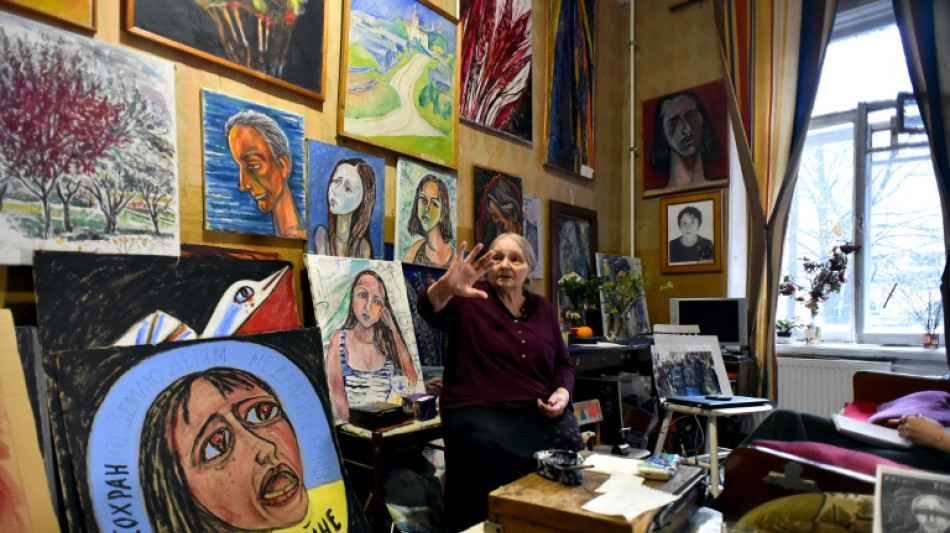
-
 Boca Juniors sack coach Gago ahead of Club World Cup
Boca Juniors sack coach Gago ahead of Club World Cup
-
Trump celebrates tumultuous 100 days in office as support slips

-
 Forest face 'biggest games of careers' in Champions League chase: Nuno
Forest face 'biggest games of careers' in Champions League chase: Nuno
-
Stocks waver as investors weigh earnings, car tariff hopes

-
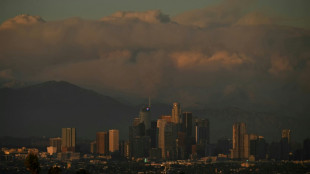 US climate assessment in doubt as Trump dismisses authors
US climate assessment in doubt as Trump dismisses authors
-
W. House slams Amazon over 'hostile' plan to display tariff effect on prices

-
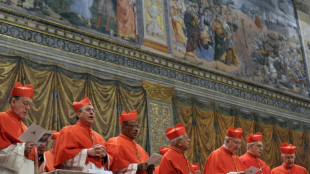 What we know ahead of conclave to elect new pope
What we know ahead of conclave to elect new pope
-
EU top court rules 'golden passport' schemes are illegal
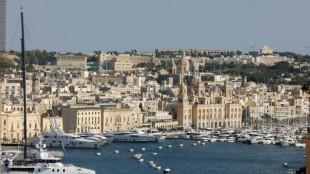
-
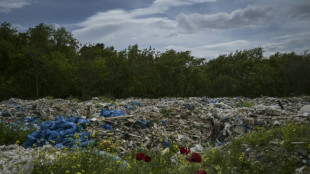 Mounds of waste dumped near Athens's main river: NGO
Mounds of waste dumped near Athens's main river: NGO
-
Spain starts probing causes of massive blackout

-
 France targets cheap Chinese goods with fee on packages
France targets cheap Chinese goods with fee on packages
-
Amnesty accuses Israel of 'live-streamed genocide' in Gaza

-
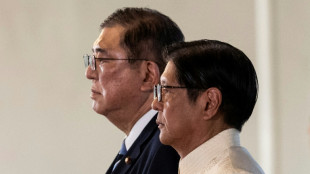 Japan, Philippines leaders vow to deepen security ties
Japan, Philippines leaders vow to deepen security ties
-
AstraZeneca moves some production to US amid tariff threat

-
 Shadman's ton gives Bangladesh lead in 2nd Zimbabwe Test
Shadman's ton gives Bangladesh lead in 2nd Zimbabwe Test
-
Barca's Yamal: I admire Messi but don't compare myself to him
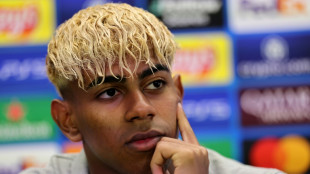
-
 Pfizer profits dip on lower Paxlovid sales
Pfizer profits dip on lower Paxlovid sales
-
French right-wing TV host fans talk of presidential bid
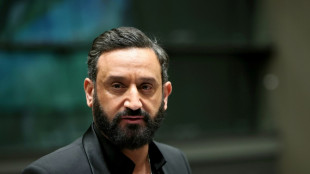
-
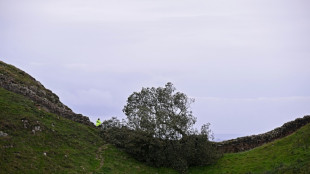 Two men in court charged with 'moronic' felling of famed UK tree
Two men in court charged with 'moronic' felling of famed UK tree
-
Amnesty accuses Israel of 'live-streamed genocide' against Gazans

-
 Spotify posts record profit in first quarter
Spotify posts record profit in first quarter
-
Sciver-Brunt named as England women's cricket captain

-
 GM profits top estimates, but automaker reviewing outlook due to tariffs
GM profits top estimates, but automaker reviewing outlook due to tariffs
-
Stock markets edge up as Trump softens tariff pain for auto firms

-
 Pricier trainers? Adidas warns on US tariff impact
Pricier trainers? Adidas warns on US tariff impact
-
Spain, Portugal rule out cyberattack for massive blackout

-
 Suryavanshi, 14, dubbed India's next superstar after shattering records
Suryavanshi, 14, dubbed India's next superstar after shattering records
-
Power back in Spain, Portugal after massive blackout

-
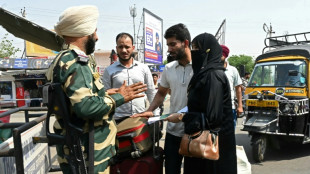 Pakistan says it shot down Indian drone along Kashmir border
Pakistan says it shot down Indian drone along Kashmir border
-
Cardinals run the media gauntlet ahead of conclave
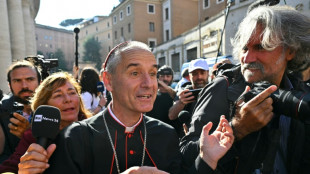
-
 BP profit drops 70% amid pivot back to oil and gas
BP profit drops 70% amid pivot back to oil and gas
-
Iran says fire contained after deadly blast at key port
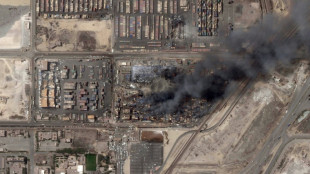
-
 Irish rappers Kneecap deny support for Hamas, Hezbollah
Irish rappers Kneecap deny support for Hamas, Hezbollah
-
Blackout plunges Spain into chaotic night of darkness
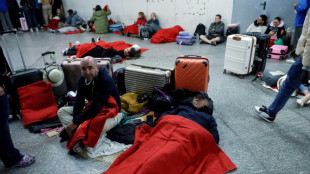
-
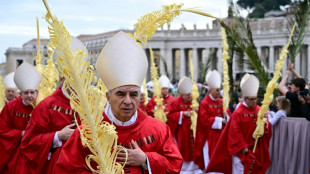 Convicted cardinal confirms he will sit out conclave
Convicted cardinal confirms he will sit out conclave
-
Kashmiris fortify bunkers anticipating India-Pakistan crossfire
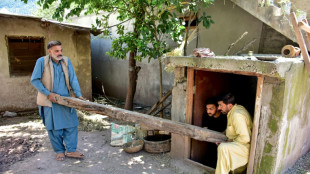
-
 Adidas warns US tariffs to push up prices
Adidas warns US tariffs to push up prices
-
Markets boosted as Trump softens tariff pain for auto firms

-
 Suryavanshi, 14, dubbed 'next superstar' after batting records tumble
Suryavanshi, 14, dubbed 'next superstar' after batting records tumble
-
Australian doubles player Purcell accepts 18-month doping ban

-
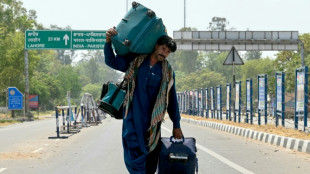 Kashmir attack unites political foes in India, Pakistan
Kashmir attack unites political foes in India, Pakistan
-
Croatia hotel toasts dizzying century of stars, sovereigns and champagne
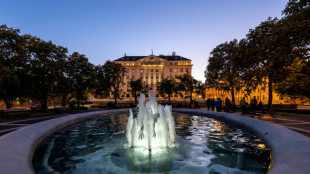
-
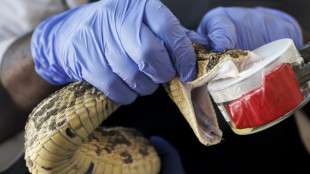 Kenya's desperate need for more snake antivenom
Kenya's desperate need for more snake antivenom
-
Les Kiss in frame with Wallabies set to name new coach

-
 Cavaliers scorch Heat, Warriors down Rockets in thriller
Cavaliers scorch Heat, Warriors down Rockets in thriller
-
Opposition wins Trinidad and Tobago election, returning Persad-Bissessar as PM
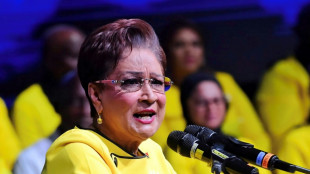
-
 Study sheds light on origin of Australia's odd echidna
Study sheds light on origin of Australia's odd echidna
-
France tries Syrian Islamist rebel ex-spokesman on war crime charges
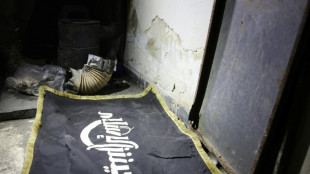
-
 Trump boasts of 'fun' 100 days, but Americans disenchanted
Trump boasts of 'fun' 100 days, but Americans disenchanted
-
Elitist no more, caviar is turning casual
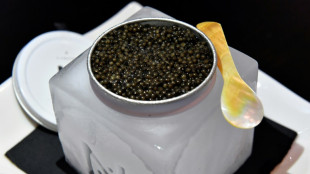

Russia artist is 76-year-old voice of protest on Ukraine
Yelena Osipova barely slept ahead of Russia's pomp-filled Victory Day celebrations on May 9.
The 76-year-old artist was up late, making placards to protest about the conflict in Ukraine.
But the moment she stepped out of her home in Saint Petersburg on her way to demonstrate, two unknown men snatched the work from her and ran off.
"It was upsetting. I'd worked half the night and really liked those placards," the white-haired painter told AFP.
"It's obvious that it was an organised attack."
Indefatigable as ever, within an hour, the tiny, stooped woman, who moves with difficulty, already had a new poster and was heading out again to protest.
Osipova is well-known in her home town.
She has been called the "conscience of Saint Petersburg," Russia's second city, after two decades spent publicly opposing the rule of President Vladimir Putin.
Since the Kremlin's forces rolled into Ukraine, she has also become a symbol of Russians standing up against the conflict.
Footage of her frequent detentions by riot police has been widely circulated on social media.
"The main thing is that people should say these forbidden words today: 'No to war'," said the former art professor.
But in Russia that is a risky prospect.
Protests have been ruthlessly stamped out and those criticising the campaign -- a "special military operation" in official parlance -- risk a 15-year jail term.
- 'Silence means agreement' -
Osipova first started taking to the streets two years after former KGB agent Putin took power in 2000.
She has been demonstrating ever since against what she says are the crimes committed by the Russian authorities.
She protested in 2014 when Moscow seized the Crimean peninsula from Ukraine and against the fighting sparked in the east of the country.
Now she is focused on Putin's full-fledged offensive against Russia's pro-Western neighbour.
"If people accept all this, then it means they are not thinking about their children," she said as she showed AFP her work in her flat.
"I'm dedicating my placards to this idea: what world are we leaving to our children?"
She shows off one poster with the face of a young girl shouting "No to war" on a yellow and blue background, the colours of the Ukrainian flag.
Another of a child has the slogan "What world are we leaving behind us?"
"Since 2002 I haven't been able to stay silent, because silence means agreement with what is happening in my country," she said.
"That's why I go to protest."
Her flat with its decrepit vaulted ceilings is in the heart of Russia's former imperial capital and has been home to her family for three generations.
Its two rooms are cluttered with pictures and posters with pacifist and anti-Kremlin messages.
"I don't want to serve as cannon fodder", reads one poster of a soldier. "Wives and mothers, stop the war," says another.
A third proclaims: "We are all hostages of the provocative politics of imperial power."
On one wall hangs a large photo of a young man: her only son, Ivan, who died of tuberculosis in 2009 at the age of just 28.
Osipova has been frequently detained by the police, but they now know her so well that they sometimes just take her straight home rather than to the station.
"I've long ago stopped being scared for myself," she said defiantly.
"In your own homeland you should not be afraid, but if you love it you should feel that you are the one in charge."
P.Mathewson--AMWN